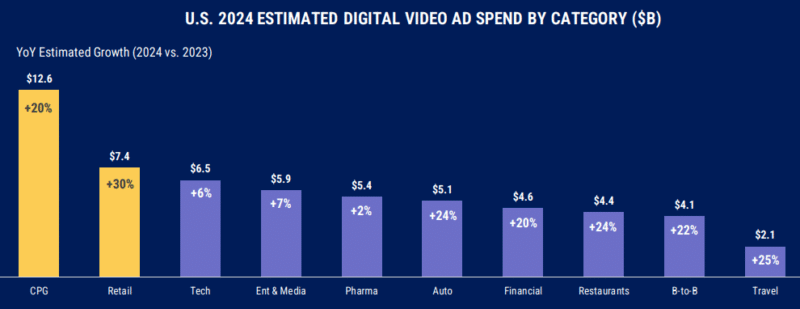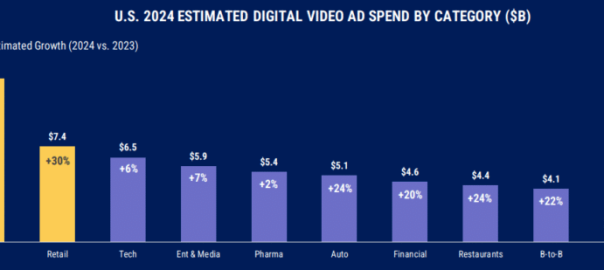Here’s the data and developments fueling advertisers’ growing interest in CTV and digital video.

Video ad spend is expected to rise 16% year-over-year in 2024. Brands are interested because of the deep penetration that CTV and digital video have with U.S. households. Streaming services and other publishers are stepping up to bring more ad-supported options to consumers, along with better ad experiences.
Here are three key reasons behind this growth in digital video and the numbers behind them.
Ad-supported CTV is widely adopted and preferred by many
CTV is an accepted part of many U.S. households. As of 2022, 93% of U.S. internet users are reachable by CTV. Since then, streaming services have introduced more subscription options as the ecosystem continues to evolve. Ads have become a bigger part of that ecosystem, and they’re accepted by many viewers.
At IAB NewFronts, LG AdSolutions shared that 80 percent of CTV watchers said they like ad-subsidized subscriptions. These consumers understand the value exchange — they pay less for entertainment and accept ads as the tradeoff. Sixty-nine percent said they prefer ad-supported CTV over other models.
LG also shared how smart TV watchers decide what to watch. Here are the top five ways they decide:
- Recommendations from family and friends (44%)
- Homepage of streaming app (40%)
- TV home screen (39%)
- Social media ads (25%)
- TV commercials (23%)
The smart TV hub or the streaming service homepage is a place where CTV viewers spend a lot of time. No wonder many services are integrating ads into these experiences. Users spend an average of 11 minutes, and 38 seconds between turning on the TV and watching content, according to LG.
Social media is a key channel (either from ads or recommendations from friends) for consumers to decide what to watch, as well as how to make decisions on purchases.
CPG and retail are the biggest-spending and fastest-growing categories
CPG and retail make up the biggest slices of digital video spend. And they’re growing. CPG brands alone are projected to spend $ 12.6 billion on digital video in 2024, according to IAB’s “2024 Digital Ad Spend & Strategy Report.” That’s up 20% from 2023. And retail is growing even higher at 30% year-over-year, projected to reach $ 7.4 billion.

CPG and retail advertisers depend on building awareness at the top of the funnel, spending billions on digital advertising to tap into, which has penetrated the vast majority of U.S. households.
But of course, digital video isn’t a “spray and pray” channel, it’s measurable and addressable. One indication of CTV’s and digital video’s precision is the growth seen in targeted B2B campaigns. B2B brands’ ad spend here is projected to climb 22% in 2024, exceeding $ 4 billion. To fill this need, LinkedIn has added CTV to its ad offering.
Influencers and the role of social media
Marketers are expected to spend $ 35.09 billion globally on influencer marketing in 2024. A quarter (26%) of marketers said they invested 40% or more of their marketing budget on influencers, according to Statista.
CTV is a key channel for amplifying influencer campaigns. Influencer marketing platform Influential is proving this out with its Influential 360 campaign tool, which measures and manages cross-channel campaigns.
At IAB NewFronts, CEO Ryan Detert unveiled a multi-channel campaign executed for QSR Whataburger that leveraged not only influencers on social but also CTV and digital out-of-home.
“The right influencer, who’s properly vetted, with the right content and the right trend can lead to real-world results,” said Detert.
The post 3 reasons why digital video and CTV are booming in 2024 appeared first on MarTech.
(18)






